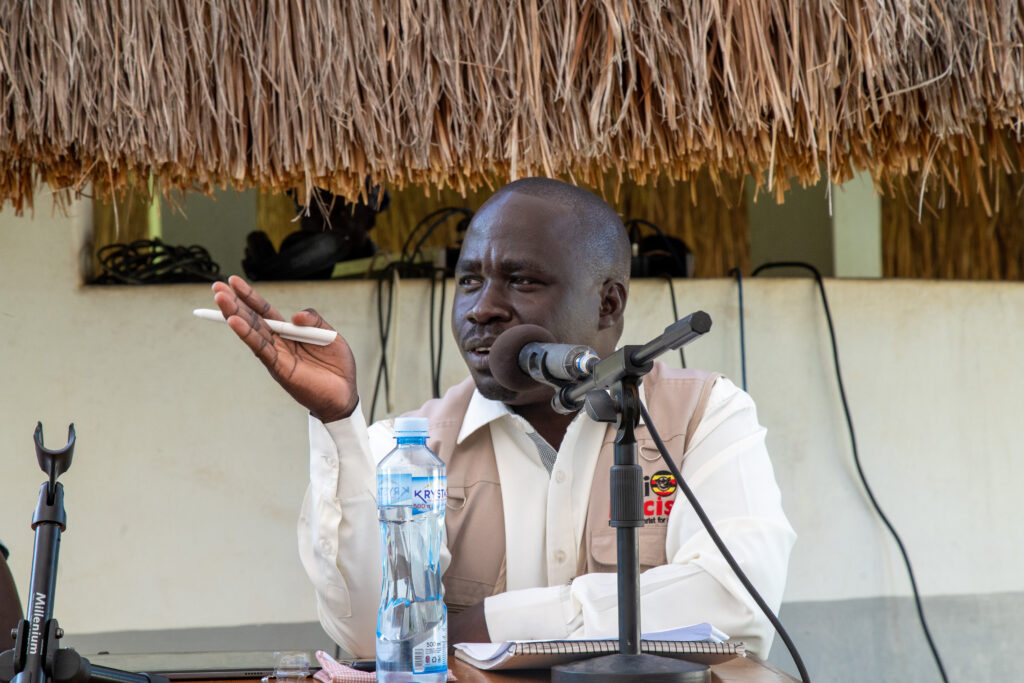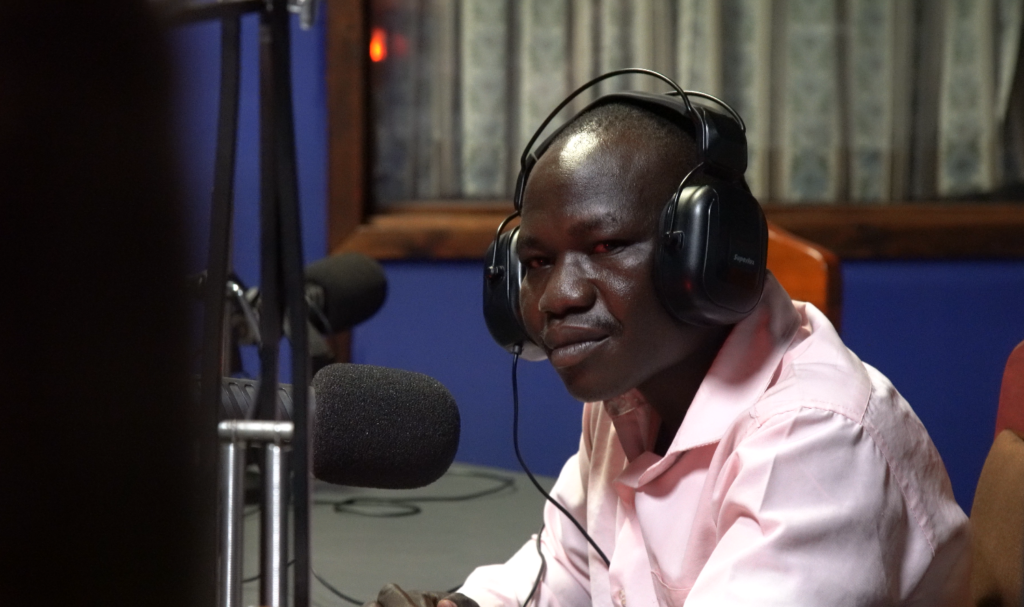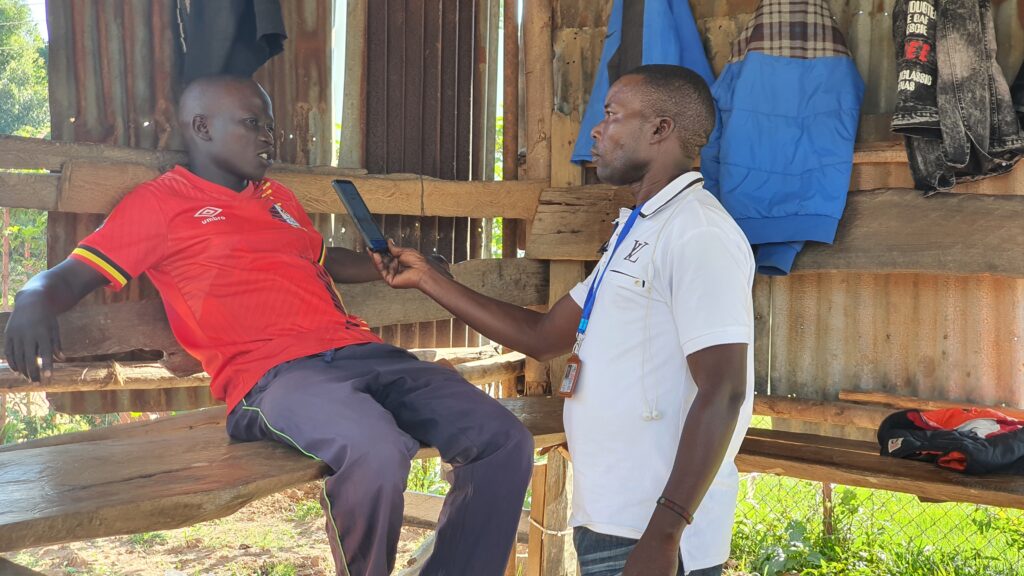Power of Conversations:
Community Journalism Distills Dialogue For Better Public Service Delivery
Written by: Rhonet Atwiine. Filmed by Richard Mugambe
Written by: Rhonet Atwiine. Filmed by Richard Mugambe
In Uganda’s northwestern city of Arua, it has become a common occurrence for leaders and community members to meet, and forge away forward on what they term as “pressing issues”.
Usually, the conversations are triggered by reports from an army of community journalists distributed in different villages across the ‘West Nile’ district.
One such area they have been lately mainstreaming is healthcare access. For about three years, the community reporters have used mobile phones to record and elevate community voices on public health to local FM station Radio Pacis where they are aired for public attention.
Over the years, residents of Arua have grappled with inadequate health facilities and personnel, drug stock out, and inadequate bed capacity among others.
Also, nestled between the borders of restive South Sudan and Democratic Republic of Congo, Arua is a magnet of migrants who add to the public health demand.
Its District Health Officer Paul Bishop Drileba says the existing health facilities are unable to meet the local demand and also serve refugees who take advantage of the porous DR Congo border to get services from Uganda.
“Yet as healthcare workers, we can’t be asking people who need support for identity to serve them. Unfortunately, the government does not consider this while allocating drugs,” Drileba told a gathering of district leaders, healthcare workers, and community members during district healthcare dialogue.

Radio Pacis Station Manager Gaetano Apamaku moderates a district dialogue session. Photo by Richard Mugambe.
The dialogues are conducted by Catholic Church-founded and popular FM Station Radio Pacis. According to station manager Gaetano Apamaku, they are leveraging the reports from community journalists to stimulate constructive conversations to improve healthcare.
“The district officials gain firsthand insights into the ground realities and promptly address the concerns raised by the community,” he said, stressing that the dialogues have been running at the lower sub county level for close to 10 years.
The community reporters are a creation of Arua Catholic Diocese. The church has staffed each administrative parish with a prefect whose role is to gather public welfare information, and share with the diocesean-founced FM station, Radio Pacis and the church media center.
Some of the community stories make it to the bulletin, while the rest is shared with other local and national media outlets through the media center.
“The idea was to have these community reporters at the level of a catholic parish. So as a station, most of the radio content comes from community reporters because we are invested in having community voices represented in the news,” Apamaku adds.
Selected from their local communities, the reporters are taken through a week’s training on basic journalistic information gathering and provided with smartphones which they use to collect images and audio from the community.
Federick Dramadri, 28, has been filing for his Bura community, Komite ward, in Arua district since 2019. Beyond the fulfillment of a childhood journalistic dream, he is proud that his journalism has changed the status of his community public health services.
“I and other fellow reporters were taken through a 5-day training in 2019 … and I started reporting during the Covid-19 pandemic,” he notes.

Federick Dramadri pictured during a presentation on Radio Pacis. Photo by Richard Mugambe.
During the pandemic Radio Pacis decided to convert its community reporters team to healthcare.
At the same time, the government was rushing to build Kawuanjeti HCIII, which previously operated as a primary healthcare outreach center in a single modest building.
However, after completion, a land ownership brawl ensued which pitted the community, landowner and government. Coupled with inadequate staffing and bed capacity, the health center closed down, leaving the community stranded.
Dramadri was the first journalist to file this story, in which he featured voices from the aggrieved land owner, and community members who were stranded in the face of the pandemic. In less than a week, the facility got staff, running water, more beds, and a fulltime incharge. The parties to the land were compensated and the place opened to the public
“My first story as a community reporter was at Kawenjueti health center III which had malfunctioned because of a land ownership challenge and people walking about 10 kilometers to the nearest facility. When it was aired, stakeholders swung into action and now it is operational,” Dramadri says.
The story opened the door for more stories on healthcare in different communities. Since then, Dramadri and an army of over 50 reporters have filed over on key health issues of public concerns on drug shortages, inadequate facilities and staffing which have for long bedeviled the public health in Arua.
From these stories, Radio Pacis has organized stakeholder conversations at sub county and district level on a weekly basis. Pertinent issues raised at sub-county level are elevated in the monthly district dialogue.
One of the key issues reported by communities for discussion is the several factors limiting access to healthcare.

Fredrick Enzama a reporter solicits voices in the communities of Vura in Arua district.
According to Micheal Ejidra, an in-charge and a medical clinical officer for Kawuanjet HC111, health workers are finding difficulty in serving amidst adequacy such as staffing.
“We are only 10 staff, both medical and non-medical. We can not be enough for all the patients. On average, we receive over 100 patients in the Outpatient Department per day,” Ejidra told district leaders in a November dialogue which brought together community members, health workers, district health officers, the chief administrative officer and other stakeholders.
In that conversation, community members shared with their leaders that they are not getting a fair deal in public health service delivery, something leaders acknowledged. Both parties commenced two hours of a blameless constructive conversation on how best things can be.
District health officer Drileba explained that a major challenge is the inadequate capacity of existing health facilities to accommodate the population of Arua, estimated at around 160,000, as well as refugees and border crossers.
“Our hospitals, like the Arua Regional Referral Hospital, often serve patients from Congo. This is due to the fact that these individuals present themselves as Ugandans, but regardless of their nationality, we cannot deny them medical services,” he explained, undertaking to continue lobbying the central government for more facilities to the clapping of community members.
Health workers also shared with communities and district leaders the challenge of serving amidst.
Also, the limited number of beds often results in overcrowding and strained resources according to community members.
“Sometimes, we have to wait a long time before they can get a bed and treatment. This can make their health get worse. It is really important to get more beds for us to make sure everyone can get the help they need and get better faster,” says Mercy Acheri, a patient at the facility.
Addressing drug stock-outs in Arua, the Chief Administration Officer for the Arua district, the John Jacob Waleega told the dialogue that budget constraints limit the procurement of drugs
“We may want to get all types of drugs, but we can’t because of the limited budget. Therefore, we opt to get the most essential drugs for the most common diseases registered,” he said.
© 2022 - Media Challenge Initiative | All Rights Reserved .
© 2022 - Media Challenge Initiative | All Rights Reserved .